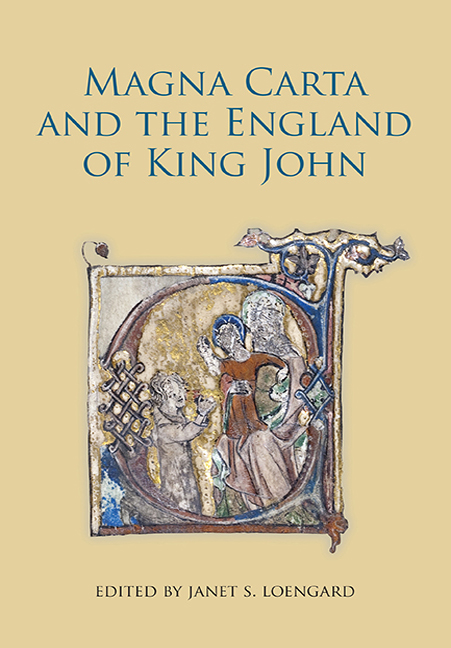Book contents
- Frontmatter
- Contents
- List of Contributors
- List of Abbreviations
- Introduction
- England in 1215: An Authoritarian Angevin Dynasty Facing Multiple Threats
- The Anonymous of Béthune, King John and Magna Carta
- Baronial Paranoia in King John's Reign
- The Forest Eyre in the Reign of King John
- The Managerial Revolution in the English Church
- Magna Carta, the ius commune, and English Common Law
- Justice without Judgment: Criminal Prosecution before Magna Carta
- What Did Magna Carta Mean to Widows?
- The English Economy in the Age of Magna Carta
- The Complaint of King John against William de Briouze (c. September 1210)
- Index
Baronial Paranoia in King John's Reign
Published online by Cambridge University Press: 28 April 2017
- Frontmatter
- Contents
- List of Contributors
- List of Abbreviations
- Introduction
- England in 1215: An Authoritarian Angevin Dynasty Facing Multiple Threats
- The Anonymous of Béthune, King John and Magna Carta
- Baronial Paranoia in King John's Reign
- The Forest Eyre in the Reign of King John
- The Managerial Revolution in the English Church
- Magna Carta, the ius commune, and English Common Law
- Justice without Judgment: Criminal Prosecution before Magna Carta
- What Did Magna Carta Mean to Widows?
- The English Economy in the Age of Magna Carta
- The Complaint of King John against William de Briouze (c. September 1210)
- Index
Summary
There comes a point in some political crises when talking stops and the parties mobilize for conflict. Civil war is rarely inevitable, and right up to the last moment it may well seem avoidable and resolvable. The descent into civil war in England in 1215 is well documented and, in the light of that documentation, looks abrupt at first sight. Unreasoning fear and persection mania – paranoia – played a powerful part in the preliminaries to the conflict, as in several other outbreaks of civil war. The king's own disposition showed such features in 1215. It has to be said that there has not been a shortage of commentators on King John's state of mind in the last years of his reign over recent decades, and I do not intend to focus particularly on that aspect of the crisis. What I do want to do is look at the collective state of mind of his opponents amongst the barons in and before 1215, so far as it is possible to do so. Fear has always been the emotion that most compels human beings to fight, and my suggestion here will be that it was unresolved and unchecked suspicion on both sides that led to the paranoia which triggered the Barons’ Rebellion of 1215.
The key work in appreciating the baronial agenda and state of mind was published as long ago as 1955 by James Holt, then a young lecturer at the University of Nottingham. His English Historical Review article, ‘The Barons and the Great Charter’, was a singularly lucid and informed analysis of the run-up to Runnymede, and the basis of his landmark monograph, The Northerners, published in 1961. Holt located a number of issues which have since been visited and revisited by other historians, and which indeed I am going to revisit once again here.
Holt's remarkable article summed up a mass of arguments and developments in a mere twenty-four pages and presented them with enviable clarity. It is not surprising therefore that it has been the basis of much of the discussion that has succeeded. His points were as follows. Despite the older tradition that the barons were puppets in the hands of the Church – and especially Archbishop Stephen Langton – when it came to putting forward their agenda for reform in 1215, Holt presented good evidence that the agenda was generated within the aristocracy.
- Type
- Chapter
- Information
- Magna Carta and the England of King John , pp. 45 - 62Publisher: Boydell & BrewerPrint publication year: 2010



